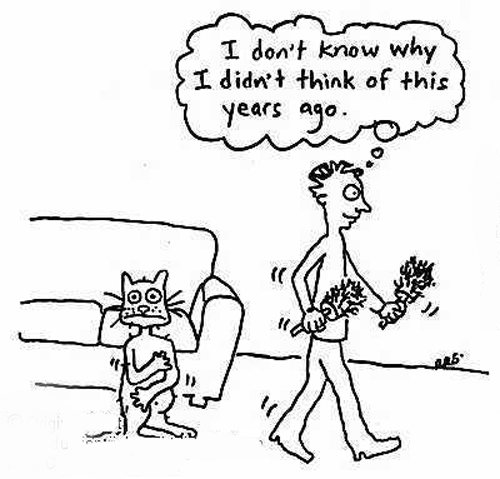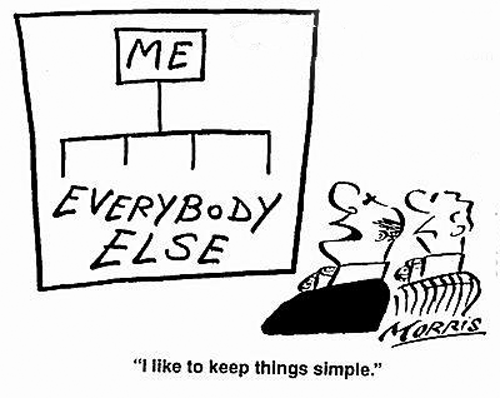The true meaning of zen. Hint: it’s not a habit.
zen is not a minimalist aesthetic or simplicity. true zen is far beyond concepts.
The following written by Sandra Day…
Every time I turn around these days there’s a new blog with “Zen” in its title.
“Zen” is being linked to everything from copywriting, web design, and business strategy to personal development, food, and far more.
Some bloggers are genuinely trying to express what they believe to be the spirit of Zen via their work and their blog. Others are simply riding the popularity wave from Zen Habits.
Yes, it’s all Leo Babauta’s fault. Just teasing, Leo! Don’t worry, I’m not going to yell at you about having the word “Zen” in your blog title. Even if I did, you would just tell me to “…breath. And then let it go.”
Besides, some credit should go to the icons who introduced Zen into mainstream consciousness starting in the ’50′s: Jack Kerouac with the book The Dharma Bums, the philosopher and writer Alan Watts, the Trappist monk Thomas Merton, and Robert M Pirsig known for Zen and the Art of Motorcycle.
But just to set the record straight, Zen is not…
• a habit
• simplicity
• a state of peace
• a state of mind
• a minimalist aesthetic
• living simply
• a destination
• nor is it just being in the moment
These are merely popular concepts about Zen. In reality, true Zen is far beyond concepts.
What is the true meaning of Zen?
Zen is a remarkable wisdom tradition.
It is a path to fully awaken to your original nature, which is present right here, right now. It is the essence of wisdom and compassion embodied in spiritual masters like Shunryu Suzuki-roishi and Thich Nhat Hahn. It is a living lineage of tradition passed on since the time of the Buddha.
“Zen” is actually shorthand for Zen Buddhism. According to the Random House Dictionary 2010, Zen is “…a Mahayana movement, introduced into China in the 6th century and into Japan in the 12th century, that emphasizes enlightenment for the student by the most direct possible means.”
Zen is practiced mainly in China, Japan, Korea, and Vietnam although there are many Zen centers in the United States as well.
The word Zen is derived from the Chinese word “chán” and the sanskrit word “dhyana,” which mean “meditation.” In sanskrit, the root meaning is “to see, to observe, to look.”
Zen is a noun. Zenic is an adjective.
It’s not uncommon to misunderstand Zen even when you study and practice it. That’s why it helps to have a teacher. The great Shunryu Suzuki-roishi once said:
“And this misunderstanding—the misunderstanding you have about Zen, I think—when we say: Zen, oh, Zen is wonderful [laughs]. Whatever you do, that is Zen [laughing]. Even though you are doing something wrong, that is Zen. Whatever you do is Zen. That is why I like Zen. [Laughs, laughter.] This kind of misunderstanding I think you will have about Zen. But what we actually mean is quite opposite.”
There is nothing imprecise about Zen. At the same time, it’s almost impossible to put your finger on true Zen.
“Zen mind is one of those enigmatic phrases used by Zen teachers to make you notice yourself, to go beyond the words and wonder what your own mind and being are. This is the purpose of all Zen teaching—to make you wonder and to answer that wondering with the deepest expression of your own nature.” – from the introduction to Zen Mind, Beginner’s Mind by Shunryu Suzuki-roishi.
Zen mind cannot be understood from the perspective of our ordinary, dualistic mind.
“We say “big mind,” or “small mind,” or “Buddha mind,” or “Zen mind,” and these words mean something, you know, but something we cannot and should not try to understand in terms of experience. We talk about enlightenment experience, but it is not some experience we will have in terms of good or bad, time or space, past or future. It is experience or consciousness beyond those distinctions or feelings. …Enlightenment cannot be asked for in your ordinary way of thinking. When you are not involved in this way of thinking, you have some chance of understanding what Zen experience is.” – from Zen Mind, Beginner’s Mind by Shunryu Suzuki-roishi.
Zen practice may calm our mind, bring more clarity, and infuse us with greater kindness. But the ultimate goal of Zen isn’t seeking or clinging to peace. Calming the mind is just one part of the story. The purpose of Zen isn’t to put an end to the activity of mind. That would be impossible anyway. As Shunryu Suzuki-roishi explains when he speaks about zazen (sitting meditation),
“When you are practicing zazen, do not try to stop your thinking. Let it stop by itself. If something comes into your mind, let it come in, and let it go out. It will not stay long. When you try to stop your thinking, it means you are bothered by it. Do not be bothered by anything. It appears as if something comes from outside your mind, but actually it is only the waves of your mind, and if you are not bothered by the waves, gradually they will become calmer and calmer.”
“Even though waves arise, the essence of your mind is pure; it is just like clear water with a few waves. Actually water always has waves. Waves are the practice of the water.. To speak of waves apart from water or water apart from waves is a delusion. Water and waves are one.” – from Zen Mind, Beginner’s Mind by Shunryu Suzuki-roishi.
If you would like a taste of true Zen, a good place to start would be with Suzuki Roishi’s spiritual classic Zen Mind, Beginner’s Mind.
The allure of the word “Zen”
There’s no turning back from the fact that Zen has acquired a “colloquial” meaning in modern life. Maybe it’s the zip and zing of the actual word “Zen” that is part of its allure. And, it conveniently rhymes with a whole range of other words making for ever so zingy blog titles. Chances are there will be many more blogs with “Zen” in their title and many other enterprises too.
Please don’t misunderstand. I’m not getting on anyone’s case. I have great respect for bloggers like Leo Babauta who are helping others live saner, healthier, and happier lives. They readily admit to having little if any knowledge of Zen, but simply like its spirit. I also appreciate blogger Mary Jaksch, an authorized Zen teacher, who explores the interface between spirituality and personal growth.
This is just a gentle reminder, amidst the frenetic activity of the blogosphere, let us not forget the profound and true meaning of Zen.
full article > always well within
Resources:
keeping it minimal…simple
• Minima
• Becoming Minimalist
• Minimal Mac
• Why the Minimalist Lifestyle Appeals to Me
the number one habit of highly creative people
zenhabits







